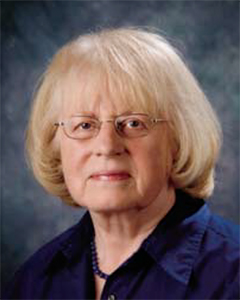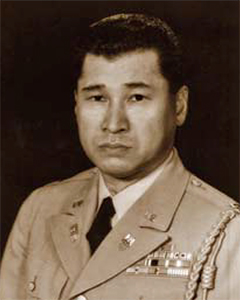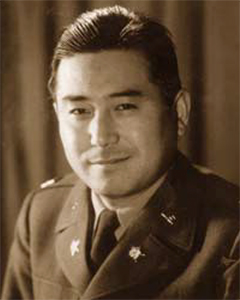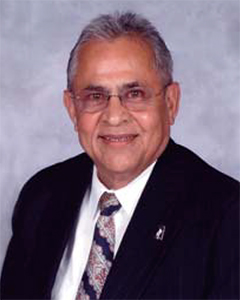Hall of Fame Inductees 2007

Mr. George X. Ferguson, Sr.
USA, Retired
During WWII, then Captain Ferguson was a critical asset to many military missions through out his various assignments. In those years he used his language skills as a foreign contingent escort for dignitaries, Chiefs of Staff, Cabinet Ministers, and General Officers visiting the United States. Additionally, his skills in both language and culture assisted with numerous military operations in Africa and Europe. Mr. Ferguson was instrumental in the Defense Language Institute’s dramatic expansion of language coverage from three to twenty languages in 1947. He was appointed as Chair of the Spanish Language Department in 1948 and later advanced to the position of Chair of the Romanic Scandinavian Division, which encompassed five languages, in 1948. He, and two others, co-authored and developed an innovative total immersion approach to language learning using processes patterned after the natural instruction techniques used by parents in teaching children to speak, read, and write. This method of total sensory learning condensed the time period to create a fully proficient linguist exponentially and is still in use today.

Mrs. Ingrid M. Hirth
DLIFLC Retiree
Mrs. Hirth served for 17 years in varying capacities at the Defense Language Institute. She was born in Czechoslovakia and fled with her family to West Germany at the end of WWII. She earned a Fulbright Scholarship and traveled to New York City where she studied French and English in addition to her previous languages of Czech and German. After her graduate studies in science and Latin at Frankfurt University she taught English, German, and computer programming in various countries throughout the world. She became a U.S. citizen in 1964. In 1982 Mrs. Hirth furthered her lifelong desire to teach and was hired as a German Language instructor at the DLI. In 1984 she served as Supervisor of the German Gateway Program for three months and earned a “Special Act Award” for development of the German Basic Course syllabus and the creation of the Air Force Exchange Scientist Course Program of Instruction. Mrs. Hirth was continually lauded by her students for her enthusiasm and love of teaching and in 1985 she mentored three additional German instructors which slashed student attrition rates. She earned Central European School Instructor of the Year honors in 1992 through her classes earning an overall 96% pass rate on the Defense Language Proficiency Test. Mrs. Hirth taught countless numbers of DOD personnel prior to her retirement as a Senior Instructor on 31 December 1998.

Colonel Thomas Sakamoto
Military Intelligence Service Language School Graduate
Colonel Sakamoto was a member of the first graduating class at the Military Intelligence Service Language School at the Presidio of San Francisco. During his 28 year career as a military linguist he used his language skills in many capacities. On one such assignment he provided crucial translation skills to Brigadier General Thomas Chase, First Cavalry Commander. Then Technical Sergeant Sakamoto quickly translated captured documents which provided the locations of massed Japanese troops. General Chase used the information to order bombardment of the previously unknown enemy positions. Immediately following, he translated another document indicating a “Bonsai” attack within 24 hours. Once again, General Chase initiated bombing of the Japanese by nine Destroyers and numerous B-29 Bombers. The flawless translations of the documents saved countless lives, led to the capture of the Los Negros Islands Naval Base and earned him the first of his two Bronze Stars. Colonel Sakamoto landed ahead of General MacArthur in the occupation of Japan and provided translation during the Japanese surrender on the U.S.S. Missouri. Additionally, Colonel Sakamoto served as the official translator for President Eisenhower on his trips to Okinawa and was advisor to the Director of Intelligence for the Royal Thai Army in Bangkok, Thailand. He also served in various other military intelligence positions including assignments at the Sixth Army Headquarters, the Headquarters US Army in Vietnam and the Office of the Deputy Chief of Staff. Colonel Sakamoto was a Defense Language Institute student in 1949-50 when he learned Russian and again in 1964 when he returned for the Basic Thai course.

Major Masaji Gene Uratsu
Army Language School Graduate
Major Uratsu was a member of the first graduating class at the Army Language School at Crissy Field, Presidio of San Francisco. During his career as a Japanese linguist he was assigned as a translator for numerous military operations during World War II. On one such appointment, he was assigned to the “Bushmasters” of the 183rd Combat Regimental Team in New Guinea were he earned his first of two Bronze Stars when he persuaded a group of Japanese Soldiers to surrender without incident. He earned his second Bronze Star as a member of an Interrogation of Prisoners of War team. During this posting, then Lt. Uratsu led a signal monitoring team to the war’s front lines. The team was regularly bombarded during the four week endeavor. His leadership in this task ensured the completion of the critical mission with no loss of his assigned troops. Major Uratsu’s military career culminated in his three year assignment as the Military Language Aid to the Civil Administrator of Okinawa. In that capacity he used his language skills to interpret for Generals in their meetings with numerous visiting dignitaries and local newspapers. In January 1961, he assumed his final post as a staff officer of the Army Language School at the Presidio of Monterey until his retirement in April of 1962.

Mr. Benjamin De La Selva
DLIFLC Graduate
Mr. Benjamin De La Selva’s linguistic career began in 1965 when he studied French at the Defense Language Institute, Foreign Language Center, in Monterey, California. After graduating from the French course he attended the Prisoner of War interrogation course at Fort Holabird, Maryland, and in August of 1966 was assigned to the 173rd Airborne Brigade in Vietnam where he served as a POW interrogator and French linguist. He performed those duties side by side with South Vietnamese soldiers, earning their respect through his knowledge of intercultural values. After a year in Vietnam, De La Selva returned to DLIFLC to learn Polish and then left the Army in 1968. After earning a Masters Degree in Education, he was hired by DLIFLC in 1972 as a teacher and writer of the new Spanish basic course. In the next decade De La Selva served in almost every DLIFLC directorate, including one and a half years as the Provost’s Program Manager. In 1985 he became dean to the combined Asian and Korean school and over the following 20 years served as school dean in charge of every major DLIFLC language program. He participated in many pioneering initiatives including Team Teaching, the Faculty Personnel System and the introduction of up-to-date teaching methods. Moreover, he led the development of much needed Spanish, Chinese, Korean, and Arabic curricula, and for four years was head of the DLIFLC Deans’ Council. During his rise from teacher to dean, he trained thousands of military linguists, guided several generations of language teachers, and mentored many supervisors and managers who now occupy leadership positions. He retired from DLIFLC in January 2005. In 2003, De La Selva founded the DLI Alumni Association, a non-profit organization which has since merged with the DLI Foundation. On 5 April 2006, California Representative Sam Farr entered De La Selva’s name and achievements into the permanent record of the U.S. House of Representatives.
